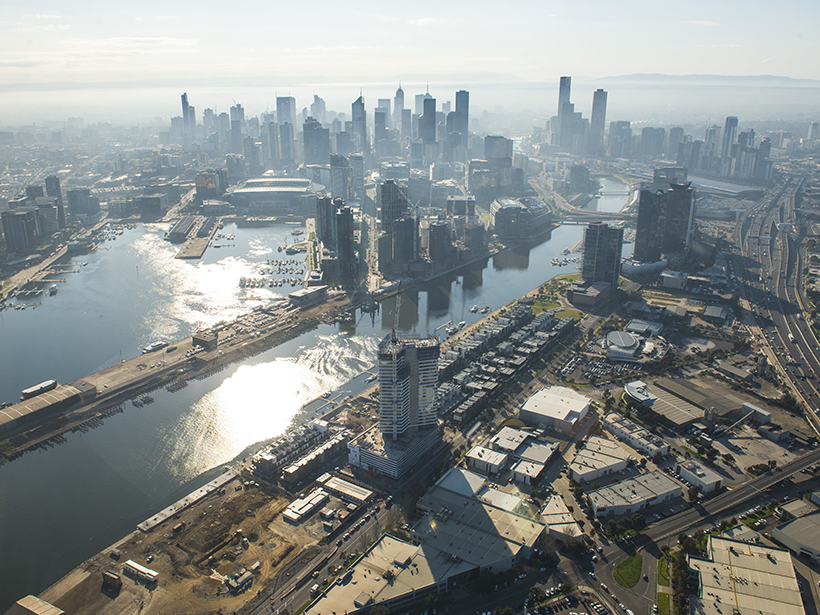Coronavirus: How will Melbourne’s Stage 4 lockdowns affect commercial real estate?

Melbourne’s stage four lockdowns will have a sweeping impact on the commercial property market, as the city begins another six weeks under more severe restrictions.
The latest restrictions, introduced on Sunday, have seen residents placed under curfew between 8pm and 5am for all non-essential activities and limited to movements within a 5km radius of their homes.
They are only permitted to leave their homes for one hour of exercise per day, with only one person from each household per day allowed to visit retail store to purchase essential items such as groceries and medicine.
Businesses considered ‘non-essential’ have been shuttered, while businesses that had welcomed workers back to their offices will predominantly return to home-based working arrangements.
And much of the manufacturing and construction industries will also be heavily affected, with a number of new rules now in place.
REA Group chief economist Nerida Conisbee says that while the lockdown will be devastating for the Victorian economy and will almost certainly impact commercial property, it may be preferable to remaining under stage three lockdowns for a longer period.
“It’s very, very bad news for the economy,” Conisbee says.
“You can’t ignore the fact that this is diabolical for economic growth. But at the same time, dragging it out over a prolonged period is also diabolical, so it’s just a very difficult situation.”
“We just have to look at it as six weeks. It’s not six years. We need to be mindful that it’s a productivity issue – it will shut businesses down.”
Conisbee says tenants unable to operate their businesses may again need to seek support from their landlords, while those property owners may need to request further loan repayment deferrals.

Melbourne’s office market will be impacted dramatically.
OFFICES
Conisbee says Melbourne’s office market will be among the hardest hit sectors, having already been heavily impacted during earlier lockdown phases.
“The CBD is going to be a ghost town for the next six weeks, which is very, very bad news for businesses and cafes and restaurants,” she says.
But she says that once business begins to return to normal, the decentralising of Melbourne’s workforce, brought on by COVID-19, may be a positive for suburban office markets.
“Not everyone can work from home, and suburban offices are also a lot cheaper, so that’s always a consideration now that people don’t necessarily need to be in the city,” she says,
“Coming out of this there will be some things that do OK, and I think suburban offices will be one of them.”
RETAIL
Already among the most heavily impacted industries throughout the pandemic, Melbourne retail property will again bear the brunt of the latest restrictions, with more shops forced to close from midnight on Wednesday.
While essential food services such as supermarkets, butchers, bakers and grocers will be allowed to continue trading, and some businesses will be permitted to continue ‘click and collect’ services, almost all others will cease trading, while restaurants and food businesses will continue to offer takeaway or delivery only.
But businesses in regional Victoria who have to close will now be eligible for the same $5000 grant applied to Melbourne businesses, while those in Melbourne will have access to another $5000 grant, bringing the total support to $10,000.
Conisbee says while the news overall will be devastating for those forced to close again, the move to restrict people to movements only within their immediate area will be a boon for local businesses that are able to remain open, and may leave a lasting legacy for local retail.
“Talking to local retailers, the fact that everyone is working from home has been very good for suburban shopping centres,” she says.
“Retailing and cafes and restaurants and the business world looks like it will become more dispersed across capital cities, rather than centralised in our CBDs, which I don’t think is necessarily a bad thing for employees.”
“What the State Government needs to ensure is that as many businesses as possible can reopen at the end of this, because it will affect the livelihoods of many, many people if businesses can’t get back up and running when the lockdown is over.”

Most children will not be able to attend childcare under stage four restrictions.
CHILDCARE
Initially one of the most shielded commercial property asset classes, due to specific Federal Government support, childcare is not immune this time around.
Childcare centres will be closed to all families, other than vulnerable children or the children of permitted workers.
During the early stages of the pandemic, the industry received significant funding to allow parents to continue working, effectively making childcare free to attend.
But all children below school age will now have to remain at home, forcing many parents to leave work to care for them, and leaving childcare operators without a large portion of their clientele.
INDUSTRIAL
Widely considered commercial property’s darling throughout COVID-19 due to the dramatic growth of online shopping, industrial properties will also be hit under the latest wave of shutdowns.
In new measures announced on Tuesday, Victorian premier Daniel Andrews said some manufacturing businesses will now have to close as of midnight on Wednesday.
CONSTRUCTION/DEVELOPMENT SITES
While construction on major projects has already been scaled back to 50% capacity, other large worksites will now face even more stringent restrictions, with only 25% of the permitted workforce permitted to work on a site at the same time.
Local trades will be able to continue. but with no more than five people on-site at any one time.







